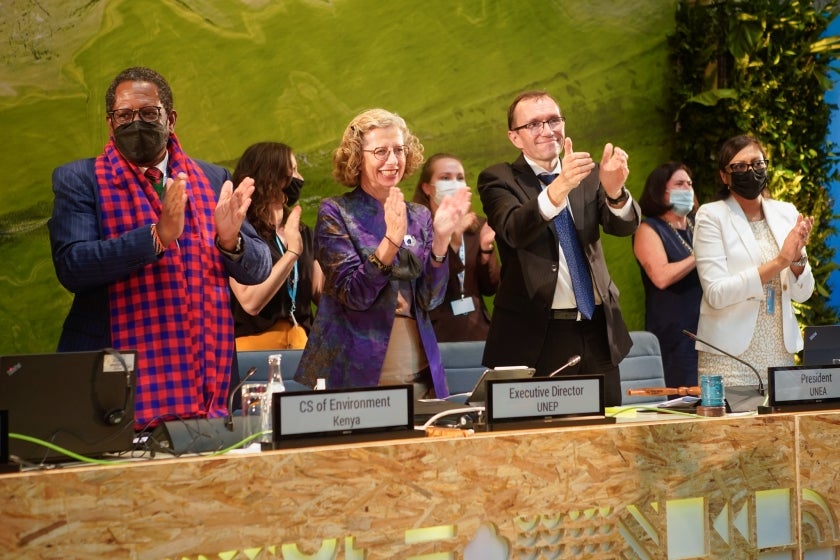UN agrees global plastic pollution treaty in ‘most significant green deal since Paris 2015’
Representatives from 175 nations agree resolution to end damaging plastic waste and forge legally-binding treaty by 2024

The United Nations Environment Assembly has approved a resolution to create the world’s first-ever global plastic pollution treaty, describing it as the most significant green deal since the 2015 Paris climate agreement.
The approval means work will now begin to set out legally binding rules on plastic waste which should be finalised by the end of 2024.
Member states have held talks for over a week in Nairobi to agree on an international pact to rein in the world’s soaring plastic pollution, which is threatening the health of ecosystems around the world.
Heads of state, ministers of environment and other representatives from 175 nations erupted into applause at the moment the deal was made.
The UNEA said the “landmark agreement” would address “the full lifecycle of plastic from source to sea”.
Plastic production has risen exponentially in the last decades and now amounts to some 400 million tons per year – a figure set to double by 2040.
Inger Andersen, executive director of the UN Environment Programme (UNEP), said the agreement is “the most important international multilateral environmental deal since the Paris climate accord”.
“This is a historic moment,” Andersen said. “I congratulate everyone involved for bringing us to this point. But a lot of work lies ahead to deal with the sheer scale of plastic pollution.”
Andersen added: “Plastic pollution is everywhere, from the deepest ocean trench to the highest mountain peak. We see this pollution. We feel its climate impacts. We live with the sheer waste of taking a versatile, durable material and making it disposable – losing all value instead of retaining it.
“Now we must make the wrong-headed way we manufacture and use plastic the past.”

UK environment minister Zac Goldsmith told The Independent: “This agreement by governments at UNEA is truly historic, and I’m so proud that the UK co-sponsored the proposals and helped get them over the line.
“In the space of just one human lifetime, we have caused unimaginable damage to the global environment, choking every single part of the global ocean with plastic pollution. And although there is much to be done now to turn it into an ambitious and far-reaching treaty, we can now begin to close this ugly chapter. I am so grateful to UK negotiators for their fantastic work securing agreement this week.”
The announcement has been welcomed by conservation groups.
Marco Lambertini, director general of WWF International, said world leaders were on the way to creating a “cleaner and safer future”, but warned that implementing the treaty will take determination.
He said: “We stand at a crossroad in history when ambitious decisions taken today can prevent plastic pollution from contributing to our planet’s ecosystem collapse.
“By agreeing to develop a legally binding global treaty on plastic pollution, our world leaders are paving the way for a cleaner and safer future for people and the planet.
“But our work is far from over – world leaders must now show even more resolve in developing and implementing a treaty which addresses our current plastic pollution crisis and enables an effective transition to a circular economy for plastic.”
Graham Forbes, global plastic project lead at Greenpeace USA, said: “Today, global leaders sitting in Nairobi heard the millions of voices around the world who are demanding an end to the plastic pollution crisis. This is a clear acknowledgement that the entire lifecycle of plastic, from fossil fuel extraction to disposal, creates pollution that is harmful to people and the planet.
“This is a big step that will keep the pressure on big oil and big brands to reduce their plastic footprint and switch their business models to refill and reuse. Until a strong global treaty is signed, sealed, and delivered, Greenpeace and its allies will keep pushing for a world free of plastic pollution, with clean air and a stable climate.”
Sailor and campaigner Ellen MacArthur, founder of the Ellen MacArthur Foundation, which campaigns for a circular economy, said: “This is a key moment in the effort to eliminate plastic waste and pollution on a global scale.
“The mandate agreed by UN member states opens the door to a legally binding treaty that deals with the root causes of plastic pollution, not just the symptoms. Critically, this includes measures considering the entire lifecycle of plastics, from its production, to product design, to waste management, enabling opportunities to design out waste before it is created as part of a thriving circular economy.”
Sian Sutherland, co-founder of campaign group A Plastic Planet, said: “We applaud the UNEA for seeing through the fossil fuel lobbying, acknowledging that we must consider the impact of plastic through its entire lifecycle, its impact on health, and crucially, making this treaty legally binding.
She added: “This is a huge opportunity for governments around the world to turn the tide on plastic and show industry that simply pumping out plastic with no responsibility for the devastation it causes is no longer acceptable.”
Join our commenting forum
Join thought-provoking conversations, follow other Independent readers and see their replies
Comments
Bookmark popover
Removed from bookmarks